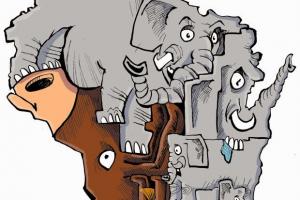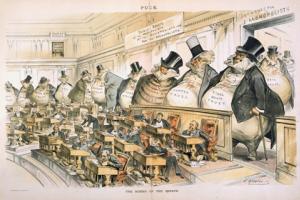Dine-Out Economy Rests on the Backs of Women
The Gender Policy Report
 Pay discrimination based on sex has been illegal since the Equal Pay Act was passed way back in 1963. Still, the pay gap remains at 22 cents on the dollar for full-time, year-round work, and it hasn’t moved in over a decade. At that pace the gap won’t close until 2059, according to the Institute for Women’s Policy Research. African-American women won’t meet the benchmark until August. Native American women must wait until September. And Latino women until November.
Pay discrimination based on sex has been illegal since the Equal Pay Act was passed way back in 1963. Still, the pay gap remains at 22 cents on the dollar for full-time, year-round work, and it hasn’t moved in over a decade. At that pace the gap won’t close until 2059, according to the Institute for Women’s Policy Research. African-American women won’t meet the benchmark until August. Native American women must wait until September. And Latino women until November.
 As Justice Kennedy writes: “Yet the law responds to proper evidence and valid inferences in ever-changing circumstances, as it learns more about ways in which its commands are circumvented.” This is a strong signal to lower courts not to apply prior cases formalistically or mechanically, but to ferret out unconstitutional racial gerrymanders that take ever-evolving form.
As Justice Kennedy writes: “Yet the law responds to proper evidence and valid inferences in ever-changing circumstances, as it learns more about ways in which its commands are circumvented.” This is a strong signal to lower courts not to apply prior cases formalistically or mechanically, but to ferret out unconstitutional racial gerrymanders that take ever-evolving form.
 Populism is an ideological chameleon—often supplemented with whatever authoritarian, nationalist or socialist inclinations held by those leading the particular movement—populist victories can (and often do) manifest in all manner of terrible ways around the world. Other times, they change the political realm for the better.
Populism is an ideological chameleon—often supplemented with whatever authoritarian, nationalist or socialist inclinations held by those leading the particular movement—populist victories can (and often do) manifest in all manner of terrible ways around the world. Other times, they change the political realm for the better.
 In some of the most brutal authoritarian regimes, labor unions have been the anchor of a broad working-class movement for democracy. Think South Africa, Brazil, South Korea. Our worker movements, political movements and unions must be wary of co-optation. We are not here for one-off gains for some of us. We are here to build broader movements for all of us. The minimum wage is a tool for organizing as much as it is a policy outcome.
In some of the most brutal authoritarian regimes, labor unions have been the anchor of a broad working-class movement for democracy. Think South Africa, Brazil, South Korea. Our worker movements, political movements and unions must be wary of co-optation. We are not here for one-off gains for some of us. We are here to build broader movements for all of us. The minimum wage is a tool for organizing as much as it is a policy outcome.
Spread the word